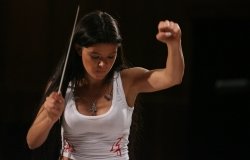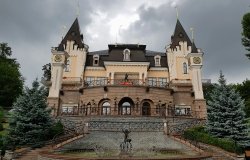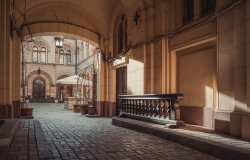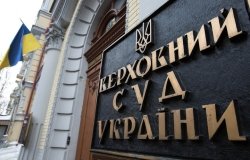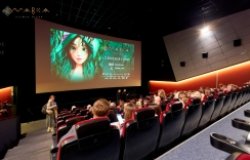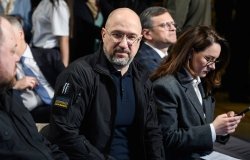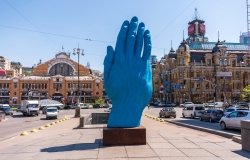
A blog of the Kennan Institute
Returning Home: The Odesa Philharmonic Celebrates a New Year in its Old Hall
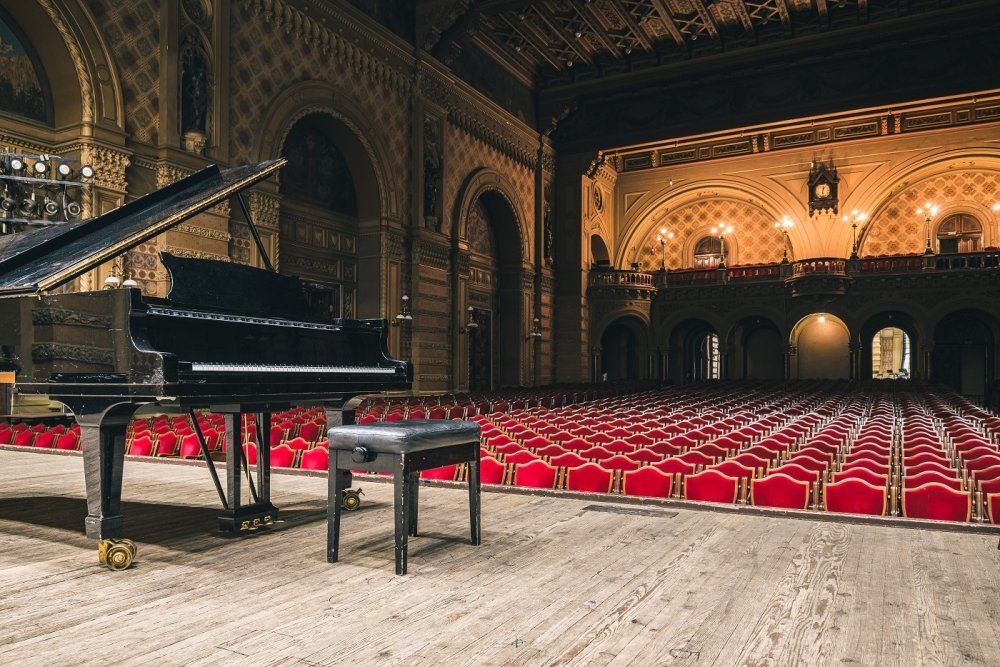
The Odesa Philharmonic Orchestra has returned home to play concerts in its own hall following nearly a year of wartime disruptions. The orchestra played its traditional Orthodox New Year’s Eve concert (January 13, 2023) in front of a thousand listeners in sold-out Philharmonic Hall. Everyone on stage and in the hall sat in the dark throughout the concert, as a blackout took hold just as the concert was scheduled to begin. A few lights on stage and numerous cellphone flashlights shown through the gloom, just like the spirit of Odesans intent on imposing their reality onto a cityscape scarred by Russian attacks.
A rousing rendition of the Ukrainian National Anthem picked up where the orchestra had left off nearly a year before. On the Saturday evening prior to the February 24, 2022, Russian invasion, maestro Hobart Earle brought down his baton following a galvanizing interpretation of the Overture to Mykola Lysenko’s opera Taras Bulba. The audience rose to its feet in patriotic fervor as the orchestra played further and further into this unexpected encore. No one could have imagined how the next year would unfold. Now, as the musicians return to their home stage, everyone understands that Ukraine will endure.
The path from last year’s closing concert to this year’s return has been long, difficult, and tortuous. The orchestra scattered as hostilities began. When they put down their instruments, they did not know when they would be able to pick them up again. Some musicians joined the country’s defense at the front. Others sought refuge throughout Ukraine and abroad. Their city came under attack, and some lost their homes entirely.
September offered a moment of hope, as the prestigious Berliner Musikfest invited the orchestra to perform. Ninety musicians gathered for the first time since the war began, with the assistance of the Ukrainian and German governments and funders. Several rehearsals in Odesa, followed by a trial concert in Chisinau, Moldova, led up to an emotionally and critically acclaimed performance in Berlin.
The orchestra’s Berlin triumph introduced European audiences to the hauntingly beautiful music by Ukrainian composers Myroslav Skoryk, Mykola Lysenko, and Alemdar Karamanov. Following the intermission, the orchestra played Jean Sibelius’s magnificent Second Symphony, with a performance that garnered interest in classical music circles. In January 2023, the orchestra’s recording of that work was featured on the BBC’s Afternoon Concert series, together with the fourth movement of Mykola Kolessa’s First Symphony.
The orchestra members appreciated this international recognition. Nothing, however, would match the opportunity of the entire orchestra’s return under maestro Earle to play on the home stage before a hall full of local fans. Despite some performances in Odesa with guest conductors, such a large-scale homecoming appeared out of reach as Russian attacks on the city’s infrastructure and residential neighborhoods ground on. The orchestra had quietly planned for precisely such an expansive re-entrance in early 2023.
The January 13 concert—which was repeated two days later with lights—continued the orchestra’s tradition of celebrating the New Year with beloved music. The program of Johann Strauss II waltzes, polkas, and marches touched off a warm and festive audience response that filled the room with an energy more powerful than that generated by electric lights.
On January 23, the orchestra gave a concert to mark the 30th anniversary of its post-independence incarnation (the Soviet-era orchestra was established in 1937). That concert featured Mozart’s Adagio from his ClarinetConcerto (KV 622), and the stunning “Moonlit Sea” Symphony No. 7, written by Crimea native Alemdar Karamanov in 1958 and first performed in 1977.
Londoners of a certain age affectionately recall the weekday concerts held throughout the Blitz, organized at the National Gallery by pianist Myra Hess. Hess and gallery director Kenneth Clark converted the museum into a concert hall offering weekday performances without a single cancelation from October 1939 to April 1946. More than 750,000 Londoners attended these lunchtime concerts over the six and a half years of war and early reconstruction. There might well be people from Odesa who will look back on their orchestra’s wartime return with similar appreciation and fondness.
The opinions expressed in this article are those solely of the author and do not reflect the views of the Kennan Institute.
See our newest content first.
Subscribe to receive the latest analysis from the Focus Ukraine blog.
About the Author

Blair A. Ruble
Former Wilson Center Vice President for Programs (2014-2017); Director of the Comparative Urban Studies Program/Urban Sustainability Laboratory (1992-2017); Director of the Kennan Institute for Advanced Russian Studies (1989-2012) and Director of the Program on Global Sustainability and Resilience (2012-2014)

Kennan Institute
The Kennan Institute is the premier US center for advanced research on Eurasia and the oldest and largest regional program at the Woodrow Wilson International Center for Scholars. The Kennan Institute is committed to improving American understanding of Russia, Ukraine, Central Asia, the South Caucasus, and the surrounding region though research and exchange. Read more


